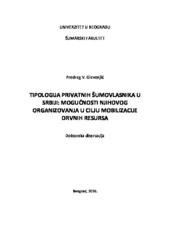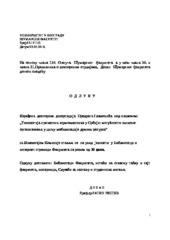Приказ основних података о дисертацији
Tipologija privatnih šumovlasnika u Srbiji: emogućnosti njihovog organizovanja u cilju mobilizacije drvnih resursa
Typology of private forest owners in Serbia: possibilities of their organization in order to mobilize wood resources
| dc.contributor.advisor | Nonić, Dragan | |
| dc.contributor.other | Ranković, Nenad | |
| dc.contributor.other | Medarević, Milan | |
| dc.contributor.other | Avdibegović, Mersudin | |
| dc.contributor.other | Pezdevšek-Malovrh, Špela | |
| dc.creator | Glavonjić, Predrag V. | |
| dc.date.accessioned | 2016-09-03T19:18:01Z | |
| dc.date.available | 2016-09-03T19:18:01Z | |
| dc.date.available | 2020-07-03T10:18:09Z | |
| dc.date.issued | 2016-07-21 | |
| dc.identifier.uri | https://nardus.mpn.gov.rs/handle/123456789/6477 | |
| dc.identifier.uri | http://eteze.bg.ac.rs/application/showtheses?thesesId=3790 | |
| dc.identifier.uri | https://fedorabg.bg.ac.rs/fedora/get/o:12741/bdef:Content/download | |
| dc.identifier.uri | http://vbs.rs/scripts/cobiss?command=DISPLAY&base=70036&RID=513491100 | |
| dc.description.abstract | Privatne šume predstavljaju značajan prirodni resurs, imajući u vidu da čine skoro polovinu ukupne površine šuma u Srbiji. Gazdovanje privatnim šumama, trajnost prinosa i održivost, između ostalog, zavise od vlasnika privatnih šuma (VPŠ). Period tranzicije karakterišu velike socio-demografske promene, nastanak „novih“ vlasnika šuma, nedostatak procesa udruživanja vlasnika i pojava raznolikosti u ciljevima gazdovanja, odnosno, prioritetima VPŠ u gazdovanju šumskim posedom. Pomenuti problemi, uz prisustvo velikog broja vlasnika šuma i veliku usitnjenost privatnih šumskih poseda, vode ka niskom nivou mobilizacije drvnih resursa iz privatnih šuma. Sa druge strane, prisutni su sve veći zahtevi za korišćenjem obnovljivih izvora energije i uvećane potrebe drvne industrije za sirovinom. U tom smislu, problem istraživanja predstavlja kompleksan pristup tipologiji VPŠ, modelu organizovanja VPŠ i merama podrške u cilju unapređenja mobilizacije drvnih resursa, odnosno, analiza: karakteristika vlasnika i njihovih poseda, tipova VPŠ, stavova VPŠ, aktivnosti u okviru modela organizovanja VPŠ i mera podrške u odnosu na izdvojene tipove VPŠ. Na osnovu toga, definisana su tri opšta cilja istraživanja: 1) utvrđivanje tipova VPŠ i karakteristika vlasnika u okviru izdvojenih tipova, 2) utvrđivanje stavova VPŠ u odnosu na mobilizaciju drvnih resursa i 3) utvrđivanje stavova predstavnika VPŠ, predstavnika industrije prerade drveta, donosioca odluka i eksperata u šumarstvu u odnosu na definisani predlog organizovanja VPŠ i kreiranje mera podrške prema različitim tipovima vlasnika šuma, u cilju mobilizacije drvnih resursa. U odnosu na definisane ciljeve istraživanja, svrha istraživanja je utvrđivanje tipova VPŠ, mogućnosti organizovanja vlasnika šuma i predlog modela njihovog organizovanja, kao i definisanje selektivnih mera podrške, u cilju mobilizacije drvnih resursa, prema različitim tipovima VPŠ. Predmet istraživanja predstavljaju: socio-ekonomske karakteristike VPŠ, karakteristike šumskih poseda, stavovi VPŠ (u odnosu na: mere podrške šumarstvu privatnog sektora, mobilizaciju drvnih resursa, ciljeve gazdovanja šumskim posedom, institucionalne aspekte i interesno organizovanje vlasnika), modeli organizovanja VPŠ i stavovi predstavnika odabranih organizacija, u odnosu na predloženi model organizovanja i predložene mere podrške prema različitim tipovima VPŠ, u cilju mobilizacije drvnih resursa. U skladu sa ciljem i predmetom istraživanja, definisane su tri opšte hipoteze, a za svaku od njih i posebne hipoteze, zbog sveobuhvatnije analize i pravilnijeg tumačenja dobijenih rezultata. U odnosu na metode istraživanja, korišćene su opšte (statistička metoda), osnovne (komparativna metoda) i posebne naučne metode (metode analize i sinteze, generalizacije i specijalizacije i metode indukcije i dedukcije). Kao istraživačke tehnike, korišćene su: tehnike ispitivanja (anketa „od vrata do vrata” i pojedinačni, usmereni intervju) i tehnike strateškog menadžmenta („benchmarking” i SWOT analiza)... | sr |
| dc.description.abstract | Private forests are an important natural resource, given that they account for almost one half of the total forest area in Serbia. Among other things, private forest management, durability of yields and sustainability of return depend on private forest owners (PFO). The period of transition is characterized by great socio-demographic changes, the emergence of "new" forest owners, the lack of PFOs association, and a rise in the diversity of management objectives, i.e. the PFOs' priorities in forest management. Along with the presence of a large number of PFOs and great fragmentation of private forest holdings, the above mentioned problems lead to a low level of mobilization of wood resources from private forests. On the other hand, there is an increasing demand for the use of renewable energy sources and a growing need of wood industry for timber raw material. In this sense, the research problem is a complex approach to the typology of PFOs, the model of PFOs organization and support measures aimed at the mobilization of wood resources, i.e. the analysis of PFOs’ characteristics and properties, types of PFOs, their attitudes, activities within the model of organization, and support measures pertaining to defined PFO types. On the basis of that, three general research objectives have been defined: 1) the identification of PFOs types and characteristics of the owners within the selected types, 2) the determination of PFOs’ attitudes in relation to wood resources mobilization and 3) the definition of the attitudes of PFOs, wood processing industry representatives, decision makers and forestry professionals towards the defined proposal of PFOs organization and the creation of support measures according to different types of PFOs aimed at wood resources mobilization. In accordance with the defined research objectives, the purpose of this research is to determine the types of PFOs and the possibility of forest owners’ organization, as well as to propose a model of their organization and define selective support measures aimed at wood resources mobilization according to different PFO types. The subject of research are: socio-economic characteristics of PFOs, the characteristics of forest holdings, PFOs’ attitudes (towards: support measures for the private forestry sector, wood resources mobilization, forest management objectives, institutional aspects and interest organization of owners), the models of PFOs organization and attitudes of the representatives of selected organizations towards the proposed model of organization and support measures by different types of PFOs in the aim of wood resources mobilization. In accordance with the objectives and the research subject, three general hypotheses have been defined and for each of them specific hypotheses have been defined, for more comprehensive analysis and more accurate interpretation of the results. The following research methods were used: the general (statistical) method, the basic (comparative) method and the specific (analysis and synthesis, generalization and specialization and induction and deduction) scientific method... | en |
| dc.format | application/pdf | |
| dc.language | sr | |
| dc.publisher | Универзитет у Београду, Шумарски факултет | sr |
| dc.relation | info:eu-repo/grantAgreement/MESTD/Integrated and Interdisciplinary Research (IIR or III)/43007/RS// | |
| dc.rights | openAccess | en |
| dc.rights.uri | https://creativecommons.org/licenses/by-nc-nd/4.0/ | |
| dc.source | Универзитет у Београду | sr |
| dc.subject | organizacija | sr |
| dc.subject | organization | en |
| dc.subject | vlasnici privatnih šuma | sr |
| dc.subject | šumarstvo privatnog sektora | sr |
| dc.subject | tipologija vlasnika privatnih šuma | sr |
| dc.subject | mobilizacija drvnih resursa | sr |
| dc.subject | modeli organizovanja vlasnika privatnih šuma | sr |
| dc.subject | mere podrške vlasnicima privatnih šuma | sr |
| dc.subject | private forest owners | en |
| dc.subject | private forest sector | en |
| dc.subject | typology of private forest owners | en |
| dc.subject | wood mobilization | en |
| dc.subject | models of private forest owners organization | en |
| dc.subject | support measures for private forest owners | en |
| dc.title | Tipologija privatnih šumovlasnika u Srbiji: emogućnosti njihovog organizovanja u cilju mobilizacije drvnih resursa | sr |
| dc.title | Typology of private forest owners in Serbia: possibilities of their organization in order to mobilize wood resources | en |
| dc.type | doctoralThesis | en |
| dc.rights.license | BY-NC-ND | |
| dcterms.abstract | Нонић, Драган; Aвдибеговић, Мерсудин; Ранковић, Ненад; Медаревић, Милан; Пездевшек-Маловрх, Шпела; Главоњић, Предраг В.; Типологија приватних шумовласника у Србији: емогућности њиховог организовања у циљу мобилизације дрвних ресурса; Типологија приватних шумовласника у Србији: емогућности њиховог организовања у циљу мобилизације дрвних ресурса; | |
| dc.identifier.fulltext | https://nardus.mpn.gov.rs/bitstream/id/30651/Disertacija4440.pdf | |
| dc.identifier.fulltext | https://nardus.mpn.gov.rs/bitstream/id/30652/Glavonjic_Predrag_V.pdf | |
| dc.identifier.fulltext | http://nardus.mpn.gov.rs/bitstream/id/30651/Disertacija4440.pdf | |
| dc.identifier.fulltext | http://nardus.mpn.gov.rs/bitstream/id/30652/Glavonjic_Predrag_V.pdf | |
| dc.identifier.rcub | https://hdl.handle.net/21.15107/rcub_nardus_6477 |



